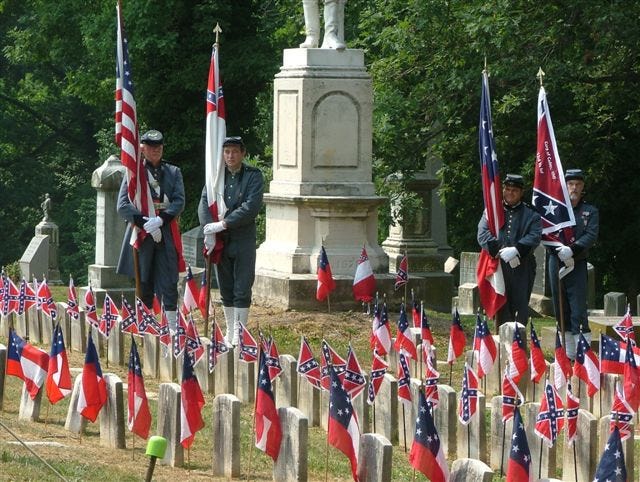Today is Confederate Memorial Day in Alabama. All state offices are closed to mark this holiday.
Back in 2018, then UNC Chancellor Carol Folt issued a statement on the future of the campus’s Confederate statue known as “Silent Sam.” [Just a few months later the statue was pulled down by students and activists.] In it she attempted to thread the needle between the different meanings that Americans attach to Confederate monuments and the meaning of holidays like Confederate Memorial Day.
She said:
At the same time, we also hear daily from our community, citizens from across North Carolina and the country, who have always seen the statue as a memorial to fallen soldiers, many of them family members. I hope we can agree that there is a difference between those who commemorate their fallen and people who want a restoration of white rule. Reconciliation of our past and our present requires us to reach deep into our hearts and across the state to the people we serve.
The initial push to construct monuments in the former Confederacy took place in cemeteries throughout the South and were intended primarily to mourn the dead. [This is explored thoroughly in Caroline Janney’s book, Burying the Dead, But Not the Past (UNC Press)] We tend today to dismiss or ignore the history of Confederate monuments as it relates to this profound sense of mourning and loss that hung over countless families in our push to reduce everything to the re-establishment and maintenance of white supremacy during the Jim Crow-era.
During this later period white southerners continued to view these monuments and statues as places to remember the fallen and their sacrifice, even as these very same ceremonies helped to prop up and justify local governments steeped in white supremacist rule.
Organizations like the United Confederate Veterans, Sons of Confederate Veterans, and United Daughters of the Confederacy were established, in part, to keep the memory of these men alive for a new generation that had not experienced the war years and even Reconstruction.
But my question today is the extent to which Folt’s statement even applies to how Americans, particularly in the South, identify with these monuments and statues as places to mourn the dead. Few people attend Confederate Memorial Day ceremonies and those who do tend to be older. Membership in the UDC and SCV continues to fall to the point where it is difficult to imagine them even existing in a few decades.
My point is that Folt’s statement is more political or an attempt to find common ground as opposed to accurately reflecting how Americans interpret these monuments and why some continue to rally around them.
There is very little evidence that I have seen which suggests that the majority of monument defenders have Confederate ancestors or if they do that it is their memory that is driving their actions.
All of this said, I do believe that for those Americans who have a need to commemorate their Confederate ancestors or Confederate dead generally that they be allowed to do so. There are numerous Confederate cemeteries that can and do accommodate these ceremonies and the location is entirely appropriate. In fact, it is difficult for me to understand why these people would not want to confine themselves to the quiet and privacy of these locations given the very bitter and divisive debates about monuments and Confederate memory generally.
The fantasy that you can mourn Confederate dead in public spaces today without acknowledging the cause for which they fought and apart from roughly the last 150 years of American history is ‘gone with the wind.’
For most Black and white Alabamians this holiday holds no significance. In fact, I suspect few people are even aware that today is a holiday. For state employees I suspect all it means is a long weekend. Even so, there is absolutely no justification for continuing a holiday that asks its citizens to recognize and honor men who gave their lives so that a slaveholding republic could exist indefinitely.
Earlier this year, Representative Chris England introduced legislation to remove Confederate Memorial Day and instead make Election Day a state holiday. The bill did not get a committee vote.





So back when I was doing living histories and reenactments I ended up a part of a color guard for a Confederate Cemetery.
Backstory: Battle of Resaca (decent event honestly), depending on the numbers needed for the scenarios I usually flip-flopped sides. Found myself with the Confederates one Sunday morning and after the battle they did a march to the cemetery.
https://en.wikipedia.org/wiki/Resaca_Confederate_Cemetery
But it was a curious event to the say the least. Had a sermon and everything.